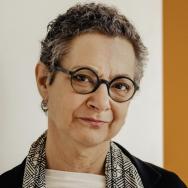Prof. Lauren Berlant, a world-renowned scholar who examined what sentimentality means in American culture for gender, sexuality and politics, died June 28 of a rare form of cancer. A beloved mentor and esteemed colleague who spent nearly four decades at the University of Chicago, Berlant was 63 years old.
Remembered by colleagues for their immense pedagogical curiosity, their perceptive interpretations of American literature, politics and culture and their collaborative prowess, Berlant gave readers the tools for understanding the complicated interactions between self and society.
The George M. Pullman Distinguished Service Professor in the Department of English Language and Literature, Berlant was a leading theorist whose impact stretched across disciplinary lines. They sought to define the desires and emotions that compel people to create forms of life that support a sense of belonging, and the complex ways in which gender, race, citizenship, class and sexuality affect and mold those attachments.
Berlant’s award-winning book, Cruel Optimism (2011), analyzed the devices that affect everyday human connections, and how the culturally conditioned material regard for the perfect life compels human beings to act against their own best interests.
“Lauren Berlant’s pathbreaking scholarship defined the fields of affect theory, heteronormativity and queer theory,” said Anne Walters Robertson, dean of the Division of the Humanities. “Their influence on generations of graduate students and colleagues was vast, and they will be profoundly missed.”
Beloved as a mentor, Berlant championed generations of students and colleagues. One was Laurie Shannon, PhD’96, who was a student in Berlant’s first class at UChicago and remained friends with Berlant for more than 37 years.
“Walking along North Avenue one January and analyzing some dilemma or other together, Lauren observed: ‘Poor everyone,’” said Shannon, the Franklyn Bliss Snyder Professor of English Literature at Northwestern University. “I hope these two words from Lauren capture the rangy magnanimity of their work on affect and attachment, of Lauren’s lion-hearted practice of friendship, and of a measureless contribution to the progress of so many thinkers—and feelers—around the world. Now we are poorer. But Lauren’s thought is our legacy; it teaches us that the best way to live/think/feel loss is always through love.”
Berlant took special satisfaction in working with others. In a 2019 interview, Berlant described collaboration as a “super-intensified version of teaching.”
“There’s the complete joy of the ‘not me,’” Berlant said. “Seeing somebody else at work, seeing somebody else’s generativity and seeing how, together, you can compose things that neither of you could have done by yourself.”
‘Creating intellectual spaces’
Berlant’s career-defining entry to national sentimentality and affect theory began through the study of historical novels during their doctoral studies at Cornell University. At that time, their scholarship focused on how a historical novel produces a story that moves between history and subjectivity, often entwining a law plot and a love plot. Berlant recognized how structural, functional, and political norms synergize and shape subjectivity.
Other notable books Berlant wrote include The Female Complaint: The Unfinished Business of Sentimentality in American Culture (2004); The Anatomy of National Fantasy: Hawthorne, Utopia, and Everyday Life (1991); and The Queen of America Goes to Washington City: Essays on Sex and Citizenship (1997). Their forthcoming book from Duke University Press is titled On the Inconvenience of Other People.
“Lauren Berlant had always confounded the supposed dichotomy between the academy and activism by demonstrating the degree to which ideas matter to activists and artists, and the importance of activist and artistic practice to the production of knowledge and to cultural change,” said Deborah Nelson, the Helen B. and Frank L. Sulzberger Professor in the Department of English Language and Literature. “It’s quite possible that the revolutionary and Academy Award-winning film Boys Don’t Cry, about trans teen Brandon Teena, would have never been made without Berlant’s influence on filmmaker Kimberly Peirce when she was an undergraduate at the University of Chicago.”
During a 2019 visit to campus, Peirce, AB’90, said Berlant “gave me permission to dream, and to follow my great passion to tell stories.”
Berlant’s enthusiasm for nurturing young minds at UChicago extended to support of junior faculty and a commitment to “creating intellectual spaces,” said UChicago colleague Elaine Hadley.
“Lauren wanted to know what young people were thinking and learn from them, which empowered them. On the other hand, Lauren was incisive and challenged them to work harder and be better,” said Hadley, professor in the Department of English Language and Literature.
“Lauren was always organizing reading groups that drew people from the University of Chicago and beyond, which were the modern version of the literary salons of the 18th century. My life will be bereft without their community energy.”
Berlant was born on Oct. 31, 1957, in Philadelphia and grew up in suburban Penn Valley. They earned a bachelor’s degree from Oberlin College in 1979, before moving to Cornell University, where they earned a master’s in English in 1983 and a Ph.D. in English in 1985. Berlant arrived at UChicago in 1984, just before completing their dissertation.
Berlant’s many awards included the Hubbell Medal for Lifetime Achievement from the Modern Language Association and the René Wallek Prize of the American Comparative Literature Association for Cruel Optimism. UChicago honored them with the Norman Maclean Faculty Award from University of Chicago (2019), a Faculty Award for Excellence in Graduate Teaching and Mentoring (2005) and a Quantrell Award for Excellence in Undergraduate Teaching (1989). Berlant also was a member of the American Academy of Arts and Sciences.
Berlant is survived by partner Ian Horswill, associate professor in the Department of Computer Science at Northwestern University; brother, Jeffrey Berlant; sister, Valerie (née Berlant) Davis, and spouse, Richard Davis; by five nephews and nieces: Zachary Davis, Mara Davis, Cynthia (née Berlant) Grell, Alison Berlant and Michael Berlant; and their friends beyond counting.
—This story was first published by the Division of the Humanities.

